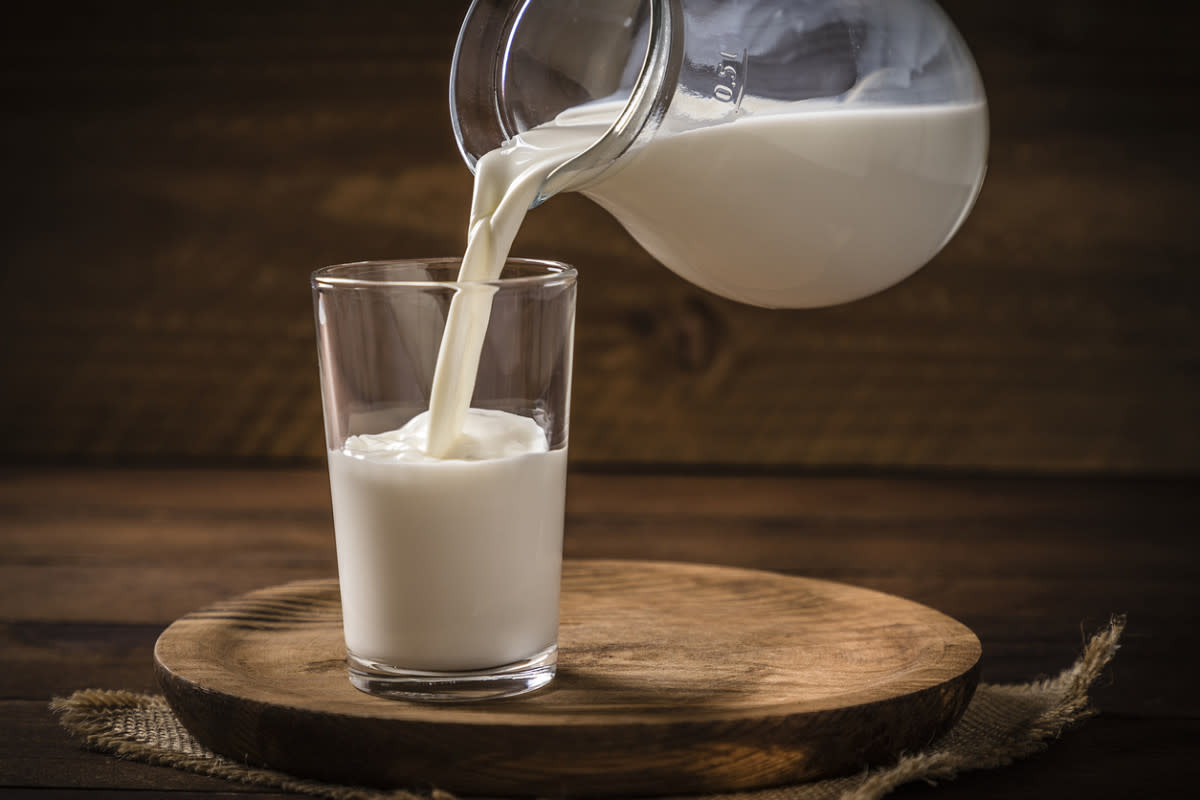Let's Settle This: Is Full-Fat Milk Good for You or Not?

Full fat milk being poured into a glass
Most people who drink cow’s milk are very loyal to the type of milk they prefer. Give someone who is used to drinking whole milk a glass of skim and they’ll likely complain that it tastes watery. Pour a glass of whole milk for someone who is used to 1% and they’ll likely wonder why it’s so thick.
While taste preference is certainly a primary reason for choosing the type of milk you buy, nutritional content is another important factor. With this in mind, you may be wondering if whole milk (also known as full-fat milk) is the best option to go for. On the one hand, there’s a lot of talk about healthy fats these days. On the other hand, whole milk does have more calories than other types of milk.
It’s time to settle the debate surrounding whole milk once and for all. Keep reading to find out what registered dietitians think, including how full-fat milk compares nutritionally to skim, 1% and 2% milk.
Related: Oat Milk vs. Almond Milk: Which One's Better For You?
Is Full Fat Milk Healthy?
According to registered dietitian Courtney Kassis, MS, RDN, LDN, not only is full-fat milk healthy, it’s the type of milk she recommends to those who are able to tolerate dairy. While she says that it’s important to note that full-fat milk does contain sugar (there are about 12 grams of sugar per cup), she explains that the fat in whole milk prevents it from spiking blood sugar levels. Kassis adds that the fat in whole milk is also satiating, which means it will fill you up more than lower-fat milk will.
Full-fat milk is also packed with nutrients. Kassis points out that it has calcium (which is important for bone health), potassium (which supports the heart, kidneys and bones), and omega-3 fats (which is important for heart and brain health).
Related: 25 Foods That Are Good For Your Heart, From Fruits and Veggies to Heart-Healthy Nuts and Seeds
“Full-fat milk can be a healthy choice depending on individual nutrition concerns and health goals,” says registered dietitian and personal trainer Victoria Whittington, RD.
She adds that the higher fat content in whole milk provides additional calories needed to support growth and energy requirements, explaining that people who have high-calorie needs (such as older adults, children, adolescents and individuals who live an active lifestyle) can benefit from drinking full-fat dairy milk. Whittington also says that the fat in whole milk also makes it easier for the body to absorb fat-soluble vitamins (A, D, E and K).
How Does Full Fat Milk Compare to Milk With Less Fat?
Okay, so, according to experts, full-fat milk is a nutritious choice. But how does it compare to skim, 1% and 2% milk? Whittington says that when it comes to choosing a dairy milk that’s the best nutritional option for you, it depends on your individual health goals.
Since full-fat milk is higher in calories and saturated fat than other types of milk, Whittington says that it may not be the best fit for those with high cholesterol, Type 2 diabetes or heart disease. “Skim milk and 1% milk have fewer calories and less saturated fat than full-fat milk. Eating less saturated fat can reduce the risk of heart disease and lower cholesterol,” she explains.
That said, Whittington says that if you do have one of these health conditions but love whole milk, you can still enjoy it and reduce calories and saturated fat in other foods, like red meat, pork, other full-fat dairy products and fried foods.
Kassis points out that skim, 1% and 2% milk have the same nutrients that whole milk does, including protein, vitamin A, vitamin D, calcium and potassium; the main difference is that they have less fat. So no matter what milk you choose, you’re still getting these important nutrients.
If you do decide to choose a lesser-fat milk, Kassis recommends being sure to get enough healthy fats elsewhere in your diet because they are so beneficial to the body, especially the heart and brain.
While both dietitians agree that full-fat milk is healthy, they also emphasize that choosing the best milk comes down to your individual health goals as well as what you like the taste of the best. After all, if you don’t like how the milk in your fridge tastes, you’re not going to reach for it very often and then your body will be missing out on the many nutrients it would otherwise benefit from.
Next up, here's how to find out how strong your bones are.
Sources
Courtney Kassis, MS, RDN, LDN, registered dietitian
Victoria Whittington, RD, registered dietitian and personal trainer
